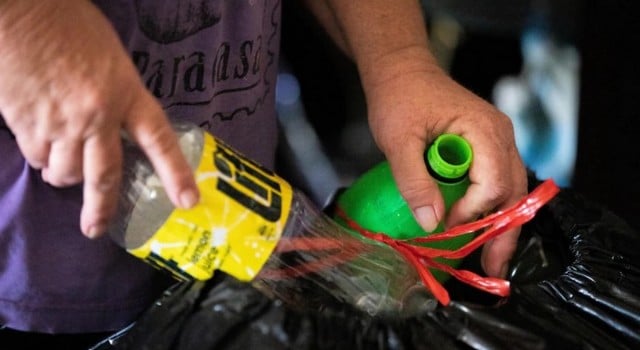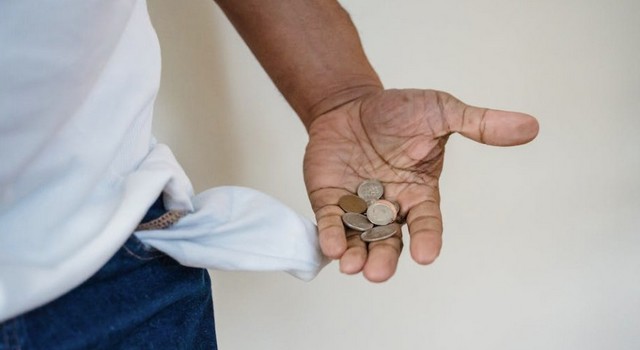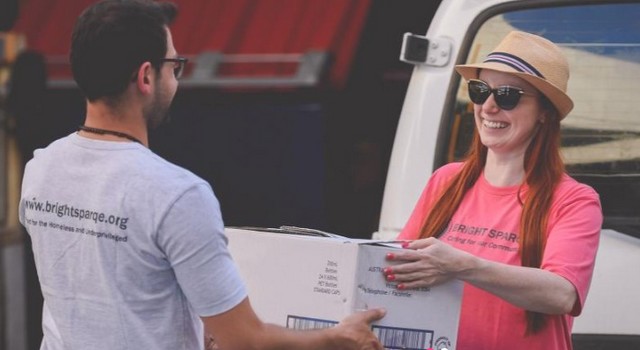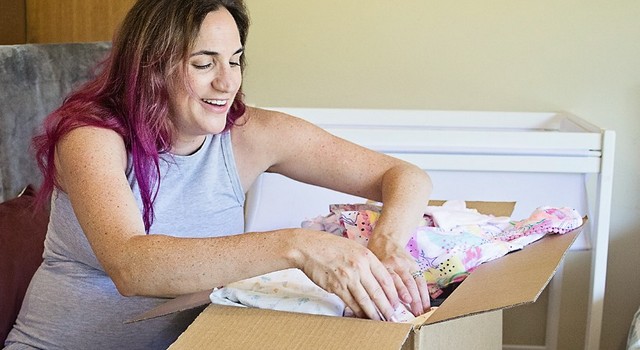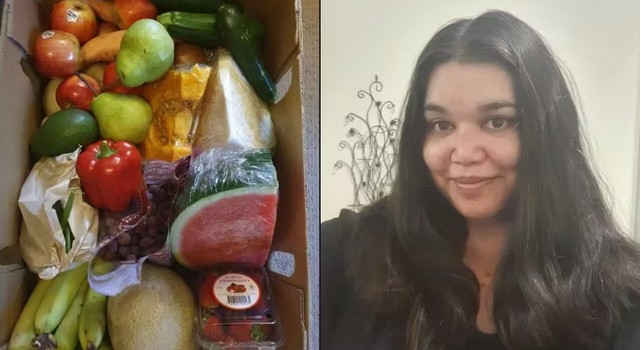By Cason Ho
Posted 8h ago
8 hours ago
, updated 3h ago
3 hours ago
A woman with short blonde hair looks out of a window of a dimly lit room.
Julie Williams is one of a growing number of Australians who have recently relied on food donations. (ABC News: Cason Ho)
Help keep family & friends informed by sharing this article
Julie Williams lost her job in January just as supply shortages hit West Australian supermarkets and fuel prices started climbing to record highs.
Like many Australians, she struggled to keep her head above water as the cost of living soared.
"Buying what I normally would is not as accessible. The [price of] food has gone up astronomically," she said.
Ms Williams cares for her 78-year-old mother and recently had her daughter's young family temporarily move in with her.
Woman hugs two young children, a boy and a girl.
Julie has a tight-knit relationship with her "grandbabies".(ABC News: Cason Ho)
But it became more difficult to make ends meet as the cost of groceries and petrol skyrocketed.
"When the fuel flew up to $2.40, I couldn't go and see [my mother] as often. And she's got issues that I deal with and I care for her," she said.
Ms Williams lost her job as a receptionist in January when her casual position was replaced with a full-time one she could not commit to.
Hands sorting through a garbage bag full of empty bottles.
Julie collects cans and bottles to hand them in for cash.(ABC News: Cason Ho)
"When I lost my job, I was pretty much a mess. I didn't know what I was going to do," she said.
"I collect bottles. Can you see? If I get thirty or forty dollars out of it, it's more than what I had before."
A clutter of receipts and notes pinned to a wall in a kitchen.
Julie puts off buying some essential goods to stretch her budget.(ABC News: Cason Ho)
Ms Williams started a new job this week, but in the three months that she was unemployed, she had to rely on donations from Crossways, a community centre providing emergency food relief in Perth's south-east.
Darlene Barron sorts the groceries that are donated to the foodbank before they are distributed to about 50 to 60 families in the local community each week.
"There's definitely been an increase in new clients coming in that haven't previously needed help," she said.
A woman in a mask and apron in a small commercial kitchen.
Volunteers prepare for the lunch rush while putting together grab-and-go meals.(ABC News: Cason Ho)
The centre also has a community kitchen which allows customers to choose how much they pay for a meal.
Some who are struggling financially come in daily for food, while others visit regularly for the company.
A woman in a mask serves customers at a table in a cafe.
Community kitchen coordinator Melissa enjoys serving her community.(ABC News: Cason Ho)
Melissa McGarry, who runs the kitchen, said she has formed friendships with many of her customers.
"Some of them come in every single day for socialisation and to have their veggies," she said.
"A lot of them don't have families anymore, they're all single or they're older."
Financial counsellors warn of debt spiral
Ms Williams has previously opted for 'buy-now, pay-later' (BNPL) schemes to pay for basic household items.
"I didn't have any pots and pans. I had one small one, and it just wasn't working," she said.
She quickly realised she was not able to make repayments and avoid extra fees, prompting her to stop using the service.
A woman smiles while holding her white dog.
Julie offers to volunteer at Crossways to pay it forward to others in need.(ABC News: Cason Ho)
But with the cost of living on the rise, St Vincent de Paul Society's financial counselling services manager Suzanne Long said an increasing number of West Australian were resorting to BNPL schemes just to afford the bare essentials.
"Instead of them going hungry, they'll use these services to get Coles vouchers and Woolies vouchers to buy food," she said.
"People are desperate and will do whatever they need to keep services on and keep food on the table."
A woman in glasses and a blue lanyard sits at a desk in a cluttered office.
Ms Long has seen an increasing number of people with BNPL debt.(ABC News: Cason Ho)
Ms Long said the number of people in need of financial assistance was growing, and some were amassing large amounts of debt by using alternative financial services.
"We've had a number of people call in, especially on casual wages, who unfortunately either have to isolate or have COVID.
"They don't have income coming in for at least a week.
"We've often had clients present with eight to 10 accounts going at the one time.
"The most vulnerable in our communities are just heading into this debt spiral of BNPL products."
A phone with the screen on, resting on the table.
Many 'buy-now, pay-later' programs are easily accessible through an app.(ABC News: Cason Ho)
The Financial Counselling Association's most recent annual survey showed a sharp increase in the number of people with BNPL debt.
In December 2021, almost half the financial counsellors surveyed said a majority of their clients had BNPL debt.
Such schemes do not fall under the same regulations as credit cards, despite having a similar function.
This means there is no requirement to check that people who sign up can afford repayments.
Marketing targets financially vulnerable
The increased reliance on BNPL schemes is being driven by downward pressures on household incomes, according to Associate Professor Billy Sung, who researches consumer behaviour at Curtin University.
"A lot of people are actually turning to these BNPL schemes for financial flexibility," he said.
"These BNPL schemes are pretty much a click away, or a few buttons away, on an app."
Man with dark blue shirt looks at computer screen.
Dr Sung said laws have failed to keep up with an exponential rise in BNPL usage.(ABC News: Cason Ho)
Dr Sung said the marketing of some of these financial products specifically targeted vulnerable people and has called for the industry to be regulated.
"They're actually saying their product is free of interest. A lot of consumers see this as a free pass to access one thousand or two thousand dollars of cash without paying any fees," he said.
"There must be some sort of best practices in advertising and marketing BNPL schemes -- the fees that are involved, the late penalty fees -- and also educating consumers that BNPL schemes are very similar in comparison to loans or credit cards."
FULL STORY
Rising cost of living sees more West Australians rely on donations and spiral into debt (ABC News)
PHOTO
Julie collects cans and bottles to hand them in for cash.(ABC News: Cason Ho)

